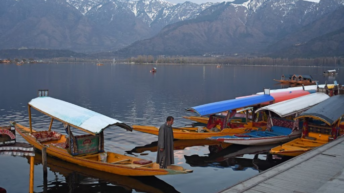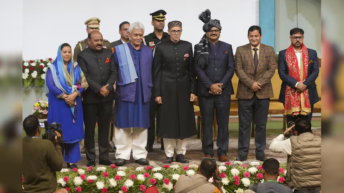|
Listen to article
Getting your Trinity Audio player ready...
|

In the 2002 Manipur elections, no single political observers expected a single party forming a government on its own and this was proved when the results came out. The Congress party emerged as the leading party but had to rely on the support of various regional parties to form the government. What was initially seen by observers as a fragile coalition government, led by a relatively unknown Ibobi Singh went on to complete its term and Ibobi led a full three term Congress regime in the state.
The authoritarian style of leadership during this 15-year regime is well documented. The Non-State Actors as well as state actors both became a nuisance to normal day to day lives of the state’s people. The indefinite bandhs, blockades which resulted in price inflation of essential goods in the state for months tested the patience of its people to the ultimate limit. The infamous killing of an unarmed youth and a pregnant woman in broad daylight by the state’s law enforcement authorities plunged Manipur into chaos, with the entire educational apparatus shutting down due to the resulting statewide protests. The hill/valley gap intensified as a consequence of the classic divide and rule tactics of the state’s leadership hierarchy, this itself was a betrayal; an insult to the social ethos on which the land was founded.
The controversial Manipur People’s Bill was passed in the state’s assembly without proper consensus which resulted in the deaths of 10 individuals from Churachandpur District. There was always the spectre of fear among the state’s citizens at the sight of uniformed personnel. The State Human Rights Commission was virtually defunct. The lack of accessibility to the leadership and nepotism running in high places are well known. There were a virtual suppression of democratic rights and people feared going out at night due to fear of getting picked up by the police or insurgents.
15th March 2017 marked the commencement of a new chapter in Manipur when the newly elected BJP led coalition govt came to power and the first steps it took were:
- Recognizing the long ignored titular King of our land, His Highness Leishemba Sanajaoba
- Ending the long-standing 169 days old Economic Blockade within a week of new government taking oath
- The grieving families of 10 victims of Churachandpur over the Manipur People’s Bill finally performed their funerals after the new government made peace with them.
All forms of blockades were drastically reduced. Cabinet Meetings began to take place in the hill districts, first time in the history of the state. ‘Go to Hills’, ‘Go to Village’, ‘Hill Leaders Day’, ‘Meeyamgi Numit’ are widely accepted and have popular appeal. Bridging hill valley divide has been one of the most successful things of present-day State government. The trust deficit between the government and the citizens began to vanish day by day with various initiatives of the State Govt like “Go to Hills” etc. ‘Ima Markets’ (women’s market) have been constructed in Churachandpur, Ukhrul, Chandel, Tamenglong, Senapati, Kangpokpi and Jiribam at an estimated cost of ₹10 crores per market.
Tourism: There has been a 222 percent increase in the international tourists’ footfalls in the state from 2016. This is a testament to the improved infrastructure and security in the state.
The upcoming National Sports University in the state will be the first of its kind to promote education in the areas of sports science, sports technology, sports management, sports coaching and will function as a national training centre for other selected training centres. Transit accommodation facilities became operational in every sub divisional and block headquarters for doctors, nurses and other govt employees.
The scheme of ‘Start Up Manipur’ provides a much-needed boost to the young entrepreneurs of Manipur with a 30 percent subsidy. Through this, many young entrepreneurs are able to provide employment to many educated/skilled unemployed youths in the state.
The CMHT (Chief Minister-gi Hakshelgi Tengbang) provides upto Rs 2 lacs free medical expenditure per head per year for economically weak families of the state. Beneficiaries of this healthcare scheme see it as a blessing from God himself.
The fear of going out at night is not prevalent anymore.
The Northeast Development Summit (NEDS), held in November 2017, was first ever summit in the Northeast, which was inaugurated by the Hon’ble President of India Shri Ram Nath Kovind in presence of Chief Ministers of all North-eastern states and ministers of the Government of India. The summit was attended by 555 delegates from across the globe and more than 100 MNCs, PSUs. NEDS was successful in a) 45 MOUs signed, b) single window clearance policy implemented under the state planning department as nodal agency. The NEDS showcased Manipur’s potential to become an investment hotspot for Southeast Asia and is in line with the ‘Act East Policy’ of the Government of India.
Installation of floodlights in the Khuman Lampak main stadium, enabling it to hold night matches- a long awaited dream for the sports loving people of the state.
The State Human Rights Commission has been revived from its previously dire state to an active, vibrant body, working day and night. Huge improvement of the two lifelines of the state, Jiribam-Imphal-Moreh and Imphal-Churchandpur-Aizawl roads have been raised from their previously deplorable condition to all weather roads within 18 months of the government coming to power. 30th September is now celebrated as ‘Irabot Day’ to commemorate one of the state’s true heroes, Jana Neta Irabot, whom we grew up idolising through our history books but never saw him given the recognition he deserved. The appointment of two men of integrity (Lt Gen Himalay and Lt Gen LN Singh) to the post of the chairman of the Manipur Public Service Commission repaired the long-lost trust in the integrity of the body amongst the general public and especially MPSC aspirants in the state. The intra state bus service, helicopter service connecting far flung hill districts with the valley has virtually eliminated the decades long connectivity problem between hill and valley.
State forest department revenue went up from Rupees 6.26 crores in 2016-17 to Rupees 23.49 crores in 2017-18, a clear sign of increased efficiency and transparency in the functioning of state departments. This is just one such example.
As part of the government’s ‘War on Drugs’ policy (a brainchild of the Manipur Chief Minister himself), law enforcement agencies in coordination with all the concerned stakeholders have been actively engaged in clearing up lands which were being used as illegal poppy plantations. The burning down of poppy plantations as part of the ‘War on Drugs’ campaign has freed up huge areas of land for horticulture, providing a much-needed impetus to the state’s horticulture and forest departments.
(.to be continued)






Great Man always done for their motherland and national pride.